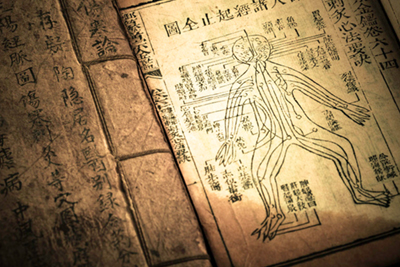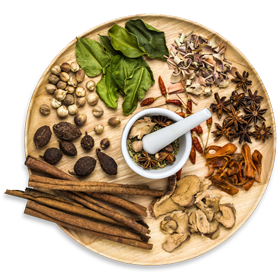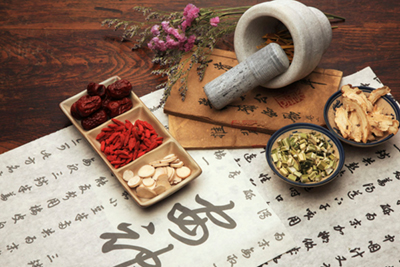Past to Present
 Chinese Herbal Medicine and acupuncture are complementary therapeutic modalities often used together in the treatment of a variety of medical conditions. Over the past 5,000 years, Chinese herbology has evolved into an art form of its own. Ancient herbal information was gathered, compiled, formulated, tested and handed down from generation to generation.
Chinese Herbal Medicine and acupuncture are complementary therapeutic modalities often used together in the treatment of a variety of medical conditions. Over the past 5,000 years, Chinese herbology has evolved into an art form of its own. Ancient herbal information was gathered, compiled, formulated, tested and handed down from generation to generation.
This compiled knowledge was leveraged in the 1960’s when the application of Chinese Herbal Medicine led to the discovery of an effective treatment for malaria. Recently, this rich history has been examined through the lens of the scientific method utilized in modern western medicine with promising results. Medical professionals are increasingly prescribing Chinese Herbal Medicine as a direct and complementary treatment for health issues that range from heart disease to IBS to the common flu.
Prescribing Herbal Medicine
In Chinese medical theory, food is medicine. There are five flavors that go to specific organs to benefit their function. The tastes are bitter, sour, sweet, pungent and salty. Bitter aids the heart, sweet benefits digestion, pungent boosts the lungs, sour helps the liver and salty charms the kidneys. Herbal formulas are usually either warming, cooling, tonifying, purging, calming or invigorating.
Individual herbs are combined in order to enhance their actions and effects on the body. When combined, a unique, synergistic formula is created. This combination increases the benefits of a particular formula and minimizes any harmful side effects.
In order to create the most effective formula, the herbs are used in different quantities and for different purposes. This allows the herbalist to create a formula aimed at addressing individual needs.
 The art and skill of creating a formula lies within choosing the precise and most effective herbs that target an individual’s disharmony. It is important to work with a qualified herbalist who can prescribe the correct formula, monitor progress and adjust the dosage and herbs as needed.
The art and skill of creating a formula lies within choosing the precise and most effective herbs that target an individual’s disharmony. It is important to work with a qualified herbalist who can prescribe the correct formula, monitor progress and adjust the dosage and herbs as needed.
Formulas can be prescribed in a number of ways:
- Raw herbs that are boiled into a tea
- Liquid extracts
- Pills
- Powders
How a Formula Works
Herbal formulas can have about eight to 15 or more herbs in a combination. This combination of herbs ensures the formula is effective, potent and gentle. Usually, there are chief herbs that target the main symptom, then there are assisting herbs and the harmonizer herb. Herbal formulas can help treat both the root and the branch of an ailment. The root is the main cause, the origin, and the branch is the symptom.
A formula can treat an acute symptom, such as a cold, and also a chronic disease associated with one of the organs, such as the kidneys. A unique thing about herbal formulas is they change as the disease changes and are modified to suit your unique constitution. There are short-term formulas and long-term formulas depending on the nature of the disease.
When an herbal formulation is produced, there is a universal method for creating a balanced formula. This method creates a chain of command that dictates the amount and use of herbal ingredients within a combined formula. The herbs are categorized as “Chief”, “Deputy”, “Assistant”, and “Envoy”. The order of the herbs ensures a harmonious formula that is created specifically for an individual to treat their needs.
Herbal extracts work best in combination with others in the formulation to be most effective.
The definition of the hierarchy of herbs is as follows:
 CHIEF HERB – This herb has the greatest effect on the principle problem and is the most important ingredient. It is the energetic and therapeutic focus of the entire formula.
CHIEF HERB – This herb has the greatest effect on the principle problem and is the most important ingredient. It is the energetic and therapeutic focus of the entire formula.- DEPUTY HERBS – These herbs support the chief herb in the treatment of the principle problem. Deputy herbs usually address secondary signs and symptoms.
- ASSISTANT HERBS – The role of assistant herbs is to support and reinforce the effects of other herbs. They also help moderate or eliminate any harsh properties of herbs within the formula.
- ENVOY HERBS – Envoy herbs harmonize, guide and focus the action of the entire formula on certain meridians or areas of the body. Chinese herbal formulas combined this way offer specific synergistic actions and effects on body and mind.
Typically, herbal formulas accompany acupuncture. Acupuncture and herbal formulas supplement each other nicely for faster results and quicker relief of symptoms. Side effects are unusual but may include digestive issues, nausea, dizziness or diarrhea. It is important to ingest quality herbs free from heavy metals and other toxins. It is not advisable to take herbs without seeing a qualified healthcare professional or to self-diagnose. See your Chinese medical practitioner to get a full diagnosis of your specific condition and be sure to inform them of any ill effects from herbs.
https://www.ncbi.nlm.nih.gov/pmc/articles/PMC5472722/
https://www.sciencedirect.com/science/article/pii/S2095754814000118
https://www.sciencedirect.com/science/article/pii/S2095754820300041
https://www.sciencedirect.com/science/article/pii/S2095754821000727





